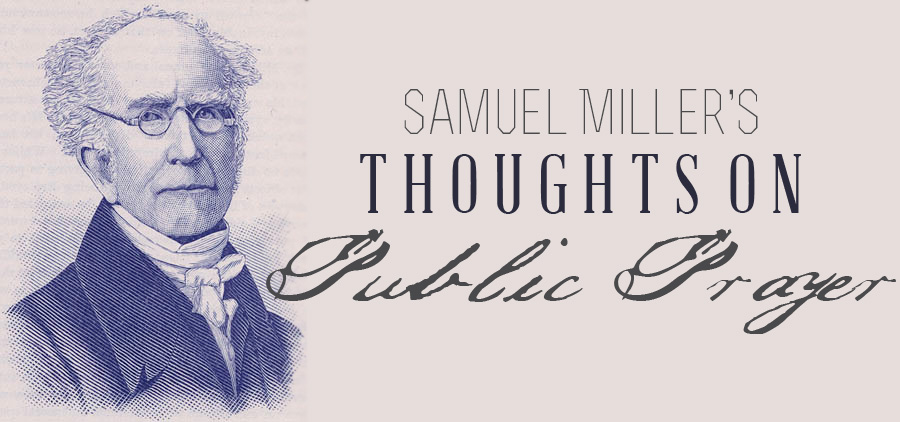The old Princeton theologian Samuel Miller closes his work, Thoughts on Public Prayer, by providing five means to excellence in public prayer.
The first means is, “None can hope to attain excellence in the grace and gift of prayer in the public assembly, unless they abound in closet devotion, and in holy communion with God in secret” (261). I found his discussion on this point to be thoroughly challenging and convicting. Here are a few choice quotes:
It is true that, without [private prayer], there may be formal accuracy [in public prayer]; much copiousness and variety, both as to topics and language; much rhetorical beauty. But without private prayer, there will not, there cannot be that feeling sense of divine things; that holy familiarity with the throne of grace, and with the covenant God who sit upon it, which bespeaks one at home in prayer, and whose whole heart is in the exercise. (261)
It cannot be doubted that a defect in private prayer is one of the most abundant sources of faults in public prayer. Hence the frigid, unfeeling accuracy, so often observable in this part of the service of the sanctuary. Hence the hesitation, the embarrassment, and the various improprieties so frequently witnessed in the public prayers of able and pious men. They have not come from their knees in private to the services of the sacred desk. They have not come with hearts reeking with the hallowed influences of the closet, to be the leaders of the Lord’s host in the sanctuary. The consequence is, their hearts are cold. (263)
It is no doubt that we sometimes meet with men of comparatively weak minds, of very small attainments in human knowledge, and in every respect unqualified advantageously to address an assembly in continued discourse, who were yet peculiarly excellent and edifying in social prayer. This is because they live at the throne of grace. (264)
If any desire to make happy attainments, and progressive improvement both in the grace and gift of public prayer, the closet will be found the appropriate and the most important nursery. (266)
We may safely say, then, that no man ever attained any high degree of excellence in public prayer, who had not previously cultivated peculiar intimacy with his covenant God in secret devotion; who had not had his heart trained to more than common familiarity with, and affection for, new covenant blessings; and his tongue loosened to pour out spiritual desires without reserve or faltering.(267)
He that would be acceptable and powerful in public prayer, must know something habitually of what is meant by “wrestling with God” in his closet: must me “mighty” in secret prayer. He who neglects this, or has little taste for this, might as well expect a miracle to be wrought for his help every time he goes to public prayer. (267-268)
It is an old maxim that no one was ever truly eloquent who didn’t really feel. Such is true when it comes to prayer. The pastor must fan the flame of his soul in the closet so that by the time he steps up to the pulpit to pray, he is burning to converse with His God.

